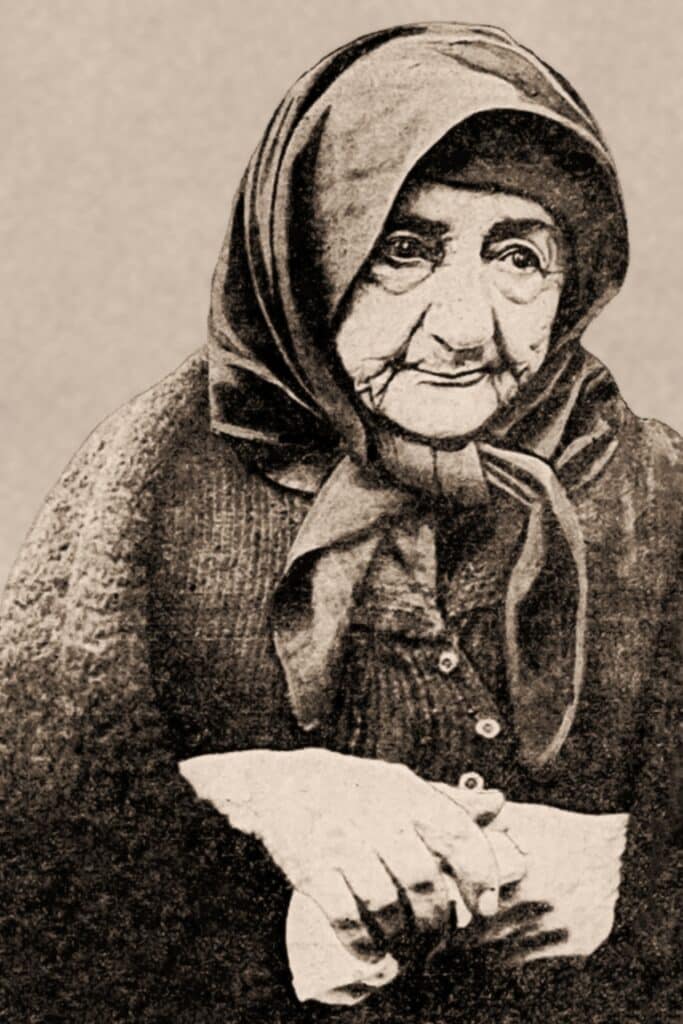The serial killer known as Baba Anujka must have seemed like little more than a sweet old lady who was always ready to help her neighbors. Besides her generosity, she was also known for her healing potions, which she sold throughout her village.
As a widow who lived to be 100 years old, it was only very late in her life that Baba Anujka’s true identity was revealed. Behind her grandmotherly facade, it turns out that she was a serial killer who used her knowledge of herbology to help dozens of village women murder their husbands.
This is the story of Baba Anujka, the sweet grandma serial killer.

A Serial Killer Is Born
Unfortunately, there is not a whole lot of information available for Ana di Pištonja, the woman who would come to be known alternatively as the “Witch of Banat,” the “Witch of Vladimirovac,” or more affectionately, “Baba Anjuka.”
Due to the dearth of evidence, we can only guess why a woman who was financially stable and with a family of her own turned into a serial killer with one of the largest death tolls in history.
Still, a look at her early life does provide some interesting clues as to why she went from herbalist to assassin.
Ana was born in Romania in 1838 (or 1836 according to her), to a rich cattleman. At the age of 11, she moved to Vladimirovac, a village in what is today Serbia. There, she was well-educated, and by all accounts enjoyed what would have been a relatively comfortable life.
However, things in her personal life were not so rosy. When she was 20 years old, she fell in love with a young Austrian military officer who infected her with syphilis and left her soon after.
Later on, she tried her luck with an older man, whom she ended up marrying and having 11 children with. Although the marriage lasted right up until her husband’s death 20 years later, 10 of her 11 children died, a series of tragedies that must have been deeply painful for a mother.
The World’s Oldest Serial Killer
It was after her husband died that Ana di Pištonja began to gradually become the serial killer, Baba Anujka. She opened up a laboratory in her home and created her own concoctions, which she sold to her neighbors.
Ana was incredibly smart. She taught herself five languages. And in her laboratory she gained extensive first-hand knowledge in chemistry, developing a reputation as a talented herbalist.
She earned good money selling potions to ailing villagers. But her fame as a healer would eventually be eclipsed by her notoriety as a killer.
Her first poisonings began with military men who wished to avoid service. She sold these men a concoction that was specially designed to make them just sick enough to avoid being conscripted while not killing them.
But her most valuable service, at least for the customers who purchased her mixtures, was her so-called “love potions.” These potions were actually poisons, which she sold to women with abusive husbands who were desperate to escape from the domestic hell that they were living in.
When one of these women entered Ana’s lab, she would ask them “How heavy is that problem?” This served as both a kind of code and a very literal question. What she really meant was, how heavy was the man who was going to be her victim?
From there it was up to the customer to administer the poison in the way she best saw fit. Laced with arsenic and poisonous plants, the man in question would be dead within one week of taking the “love potion.”
In this way, Baba Anujka killed at least 50 people, and up to as many as 150. It was only decades later that she was finally apprehended.
Baba Anujka Is Finally Caught
It turns out that there were quite a few women in Vladimirovac who wanted their husbands dead.
One woman, Stana Momirov, went to Baba Anujka at least three times to purchase her famous “love potions.” The first time was for her first husband. Satisfied with the result, she then went back after remarrying and bought potions for her new husband’s uncle and father-in-law.
Those three deaths raised suspicions and the police arrested Momirov, who eventually revealed who was really behind the poisons – Baba Anujka.
This was in 1929, by which time Baba was already an old lady of 90 years old. She tried to deny that she had ever sold poisons to women, but her customers, including Momirov, argued that they had had no idea that what they were buying was poison.
The trial ended with a guilty verdict, and Baba Anujka finally paid for her crimes with a life sentence.
But if her victims and their families had wanted justice, it is very doubtful that they ever felt satisfied with the outcome of the trial. You see, Baba Anujka may have been given a life sentence, but how much does that mean to a 90-year-old?
What’s more, Baba Anujka didn’t live out the rest of her days in prison. She was released after eight years due to her old age and enjoyed the final two years of her life back at home in Vladimirovac.
Ultimately, it is clear that Baba Anujka does not fit the typical image of a serial killer, who targets their victims out of a psychopathic desire for blood. No, the case of Baba Anujka presents something much more complicated.
She was a serial killer. After all, she was at least indirectly responsible for the deaths of dozens of people. But she was also helping to address a very real problem that many women faced: marriages that were often arranged and from which they had no recourse to escape.
Baba Anujka was a killer, but to the many women who bought her “potions,” she was no doubt also their savior.

